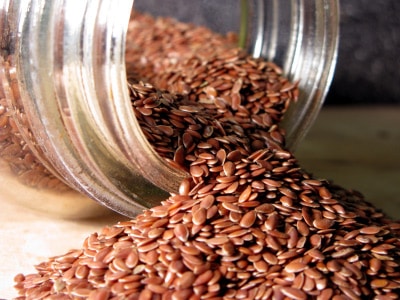Flaxseeds are a superfood, rich in micronutrients, fiber, lignans (antioxidant qualities), vitamin B1, manganese, and omega-3 fatty acids. Incorporating them into your diet can provide a healthy source of these nutritional requirements, and help lower the risk of diabetes, cancer, and heart disease.
They are among the oldest fiber crops in the world, having been cultivated in ancient China and Egypt, and can be used in any number of ways in cooking, from relishing dishes with an extra spicy twang, or making flours for creating healthy muffins, breads, or breadcrumbs.
Interestingly enough, King Charlemagne of 8th century France was so smitten with the benefits of the flaxseed that he passed laws to incorporate flaxseed into the diets of his subjects. The Latin name for flax is ‘Linum Usitatissimum’, which means “the most useful.”
For such a tiny seed, flax can deliver a load of nutrition to your table!
Normally found in types of foods ranging from yogurt to bread, flax is increasingly becoming more and more in demand. Eggs rich in omega-3 are known to come primarily from chickens which are fed only on the flaxseed.
Here are 6 Healthy Benefits of Flaxseed
1. Flaxseed is shown to decrease risk of cancer.
Studies show that people who incorporate flaxseed into their diet in moderate amounts reduce their risks for colon cancer, prostate cancer, and breast cancer.
It’s been proven that the omega-3 fatty acids hinder the growth of tumors and reduce the rate at which they appear. Lignans in flax also contribute to reducing your risk of breast cancer.
On top of this, the antioxidant properties of flax aid in cancer prevention.
2. Flaxseed promotes a healthy heart.
By stabilizing your heart rate, inhibiting inflammation, and lowering blood pressure, flax can help prevent heart failure.
If you’re a high risk of suffering from heart attack, flax will help prevent artery hardening, and plaque buildup.
3. Flaxseed helps fight diabetes.
Lignans, which are a chemical found in plants, which are prevalent in flaxseed can help improve blood sugar levels, as per a test of adults with type 2 diabetes.
4. Flaxseed can help prevent hot flashes.
In a recent study of women going through menopause, scientists determined that only 2 tablespoons of flax a day reduced hot flashes by 50%, the severity of the hot flash episodes was also significantly lower after taking flax for two weeks.
5. Flaxseed is an anti-inflammatory
The lignans and ALA found in flaxseed can help prevent inflammation, especially the inflammatory effects of asthma and Parkinson’s. The lingnans work to block agents in the body that contribute to excessive inflammation.
6. Flaxseed fights bone disease.
Everyday Health wrote that scientists were able to decrease bone loss in diabetes-ridden lab rats by treating them with the fatty acids contained in flaxseed.
Head over to Healthyflax.com for recipes on how you can incorporate flax into your diet!





Flax seed is an excellent source of much, but because of its high fiber content, you must drink plenty of water to move it from point “A” to point “B” in the body or you could find your GI track backed up.
Ground Flax seed is also excellent remedy for that nasty cough…
4 tablespoons a day for an adult.
Don’t let an uncontrollable cough get you down, fight back without the drugs or useless cough syrups.